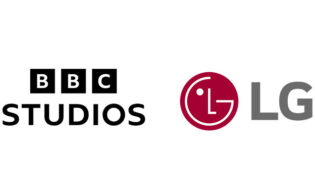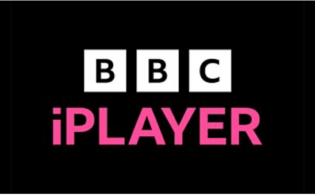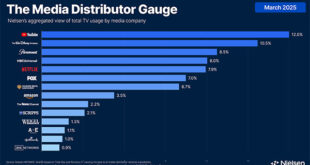Unveiling its most recent annual report last summer, BBC Studios revealed it was on track to meet its five-year commitment of £1.5 billion in returns to the pubcaster by 2026/27. That roadmap has encompassed scaling investments and restructuring, including centralizing its global sales efforts under Janet Brown last fall. As president of global content sales, Brown leads the distribution of BBC Studios’ powerhouse catalog to broadcasters and platforms across the globe. Brown caught up with World Screen to discuss her new remit and how she is navigating the opportunities and pitfalls in the global media business today.
WS: Tell us about the importance of having a centralized, global structure for BBC Studios’ sales efforts.
BROWN: Right now, it does feel like a moment to be looking at things globally. Many of our largest buyers globally are streamers. When it comes to how you’re going to invest in a piece of content, looking at the whole picture globally simplifies it. Historically, it was easy to end up with regional sales teams that just do their thing. It’s been a conscious effort to increase communication. This reorg and having global sales under me confirms a process and a way of working that we were already moving to.
WS: 2024 was a challenging year for everyone. As you head into BBC Showcase, what are you hearing from your clients about their needs in this climate, and how is BBC Studios positioned to meet them?
BROWN: It is challenging. In these times, you either rise to the occasion or don’t. We feel this is our moment. We have huge volume and breadth of high-quality content. That is a fortunate position to be in. We work with some of the best producers in the world, telling stories that spark conversations and change people’s perspectives on the world. We have this incredible library and an amazing selection, which is a great starting point but not enough. Buyers change all the time. Sometimes, they aren’t able to say what their budgets are. Or all of a sudden, they know the budget, but it’s here today, gone tomorrow. People’s roles are changing. You’re dealing with a lot of change.
On top of our fortunate position of having such incredible content is our ability to use the data and analysis to surface why certain content might make sense. The data-led approach is stronger than ever because people have limited budgets and need to know that this content will work. We’re also leaning into our general spirit of experimentation and innovation because you have to work with your buyers and partners. We focus on being an adaptable and flexible partner. It helps to have an amazing amount of content, but it’s not only what you have but how you use it.
WS: How important are deals like the one you have with ZDF Studios? Are you looking for other such alliances with like-minded broadcasters and studios?
BROWN: We are a storied brand and a long-standing part of the global media landscape, together with other studio peers who also share a lot of history. We didn’t get there by not valuing partnerships. Those partnerships change over time. Walking in here two and a half years ago, one of the things that struck me was just how strong we are at building those partnerships, maintaining them and growing them. You mentioned ZDF; we have a long-standing relationship with them for factual content, and we just renewed our scripted partnership with them. A Good Girl’s Guide to Murder was part of that, where we worked closely with ZDFneo as co-producers. We have multiple touchpoints and value them so much, not only as a commercial partner but as a creative one.
If you step back and look at the broader landscape of public broadcasters, we have a similarly long and productive relationship with France Télévisions. We’re co-producing Walking with Dinosaurs with them, among others.
There is our relationship with PBS, which just marked its tenth anniversary. Look at how much has come out of that relationship; there are landmarks, but also things like Fight the Power: How Hip Hop Changed the World. Again, these aren’t just commercial relationships; they are creative relationships, and they are dynamic.
That’s within the public-broadcaster common ethos. Beyond that, we have so many valuable partnerships in Asia. We have spent a lot of time in that market. We just did an MOU with KOCCA to co-develop, co-produce and distribute factual content with local Korean producers. We have also just completed a significant agreement with Shanghai Media Group (SMG) to screen landmarks such as Kingdom, Blue Planet III and Hidden Planet on SMG’s Dragon TV. These are complex markets with multiple players. It’s figuring out who to partner with, what to partner with them on and how to structure that relationship. I would be remiss not to mention our partnerships with streamers. Disney is a huge one for us with Doctor Who and Bluey (the TV series and the upcoming movie). We have A Good Girl’s Guide with Netflix and multiple shows with Amazon.
WS: The streamers used to want everything everywhere, and we’ve seen that model change. As you look at a piece of IP, how do you determine the best route to market?
BROWN: Certainly, in the boom time, it was almost an assumption that if you partnered with a streamer, they would be taking world rights. What’s interesting now is sometimes it’s not obvious. When we started on A Good Girl’s Guide, we had the partnership I mentioned with ZDF, a relationship in Australia and the BBC initially commissioned it, so global was off the table. Netflix came in for the remaining territories, and it was an incredible success for them. It debuted as the number one English-language TV series in the world on Netflix.
Not all content works equally well in all countries. You might start with it in a particular country and then expand if it works. Or streamers are saying, I only want it for this territory; I’m trying to fill a hole here. Sometimes, having some budget constraints helps you be quite targeted and tactical.
WS: From your vantage point, how do you see the AVOD and FAST segments as revenue-generating sales windows?
BROWN: I’m glad you said AVOD and FAST because, across the industry, people do sometimes mix the two. We do see them as different. Call it what you want, but it feels a lot like TV syndication. Technology gives you different abilities, so you don’t have the same cost to get the channel up. It does allow you to experiment more to see what’s working. We view it as a syndication window and program it as such. In the syndication glory days, you weren’t seeing lots of single-IP channels. In FAST, you can have single-IP channels and thematic channels. Not all channels work in all places. We are privileged to have channels that work in so many places, whether Top Gear or Antiques Roadshow. But then we’re looking at specific channels that will only work in the U.S. or EMEA. I do see it as a valuable syndication window. The traditional syndication windows have diminished in value, but we’re seeing FAST start to compensate, which is exciting.
WS: What trends are you watching as you look at the uncertain climate?
BROWN: One of the things we are seeing is the success of British content. In the first half of 2024, four of the top shows on Netflix were British, and two were ours (Baby Reindeer from BBC Studios’ label Clerkenwell Films and The Gentlemen from Moonage Pictures, in which BBC Studios has a minority stake). I don’t think it was just because of the strikes. The strikes were a factor, but they don’t explain everything.
We’re seeing a flight to quality; buyers want to have a guarantee of the kind of content that’s coming. British content is powering great viewing. There is more of a lean-back vibe and comfortable viewing, and we do that in spades. We are excellent at crime procedurals. One of the things that also has been talked about is returners. Buyers want to have efficiency in terms of how they market things. A returning series does give you some efficiency in terms of audience awareness. We were very excited to announce the second season of A Good Girl’s Guide. We’ll have a second season of Am I Being Unreasonable? with Hulu.
And AI is another trend we are watching and having discussions around—how we’re using it, where we’re using it, where we’re not using it and how to make sure that if we do use it in a valuable way, we can pass that on to the buyers.






